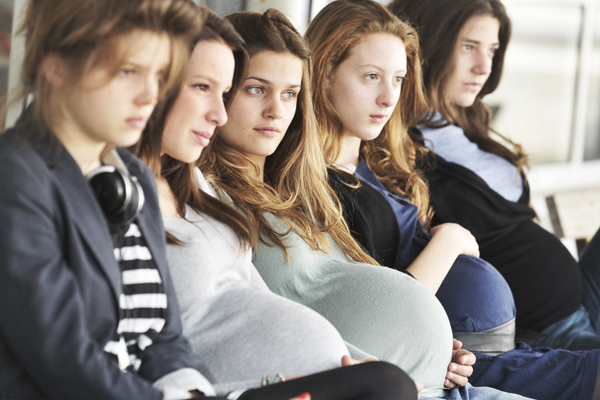
Some of the cast of 17 GIRLS (Jerome Prebois/Strand Releasing)
The 2008 news story about a group of teenage girls in Glouscester, Massachusetts, who allegedly decided to all get pregnant at the same time now comes to the big screen, having previously been the inspiration for a Lifetime Original Movie. In their first feature film, directing sisters Delphine and Muriel Coulin move the setting to their hometown of Lorient, a coastal town in Brittany. Very loosely based on the real-life events, the film shifts the story’s focus from an alarming news story to the girls themselves, trying to explore their reasoning behind such a decision while illuminating that these teenagers straddle a line between child- and adulthood.
It’s the beginning of the school year, and after a routine health check-up, Camille (Louise Grinberg) confirms her suspicion that she’s pregnant. At first, her reaction is understandable; she throws her pregnancy test into the ocean and ignores the situation for weeks. Eventually she tells her four best friends and makes the decision to keep her baby with the thought that the child would give her life direction and meaning. With her working single mother absent most of the time and her beloved older brother stationed on and off in the Middle East, Camille believes this child can give her the family she never really had.
After finding out another girl in her class is also expecting, Camille’s reasoning shifts to “wouldn’t it be great to have a friend with whom we can raise children together.” Her group of close friends, with the exception of one, all decides to join in with the plan of having unprotected sex at an upcoming party. Eerily, like a fashion or technology trend, multiple girls in the school become pregnant, prompting a kind of revolution by these teenagers for independence and control. This is complicated, however, by the inability of the people around them to understand their reasoning and by the reality of health and financial problems that come along with having a baby.
17 Girls touches on all the large, burning questions this event brings up without diving head first into any of them. There are a few scenes of the school’s teachers and administrators and of the parents’ angry reactions, questioning who exactly is to blame. There’s even mention of a media frenzy, but the true focus is on the girls themselves (all give wonderfully subtle performances, mostly played by unknown actresses). Various scenes depict the pregnant teenagers alone in their respective rooms, just sitting still in thought. There’s also a lot of focus on their bodies as they change over the course of nine months. The whole film attempts to get inside their heads and bodies, prompting us to believe that these girls understand their own reasoning behind such a decision, even if the audience doesn’t.
The Coulin Sisters do a beautiful job on the cinematography. Their passion for their location is clear in the dreamy way they focus on the ocean and buildings of Lorient. The look is reminiscent of Sofia Coppola’s The Virgin Suicides, another film about the complicated mind of the teenage girl. The dreaminess of 17 Girls, however, doesn’t quite capture the inner thoughts of its characters like Coppola’s film, but succeeds in shifting the focus from the outside world.
The teen pregnancy concern is not something that has disappeared since 2008, and it’s easy to wish the Coulin sisters spent more time dissecting the popular culture in which these girls grew up in to prompt or affect such a life-altering choice. This film is at its most stimulating, however, in the quiet moments each girl spends alone. Not only does it depict what it is like to be a pregnant teenager, but is, at its heart, an examination of the teenage girl experience as a whole.






Leave A Comment